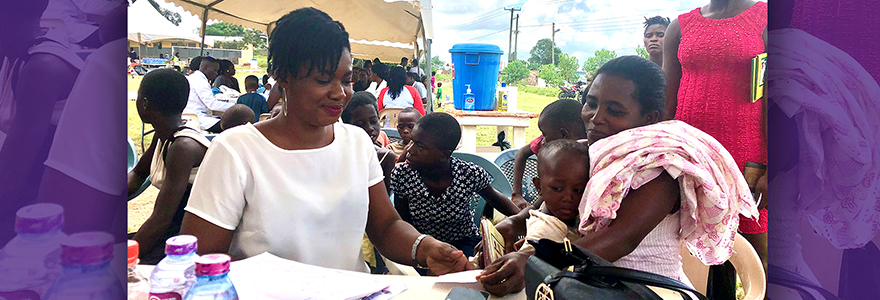Following a dream: Winifred Twum-Ampofo, Class of 2022
Feature: Following a dream to serve vulnerable populations

By Cam Buchan
Born in the small village of Asuom, Ghana, Winifred Twum-Ampofo looks back on her experiences growing up as the driving force behind her passion to be a physician.
Her mother is a teacher and always challenged Twum-Ampofo to have purpose and be assertive. “So as early as my primary education, I took leadership responsibilities and challenged myself academically to become a better person.”
Growing up, positive interactions with her pediatrician fueled her interest in the medical field.
Now the student in the Master of Public Health (MPH) program at Schulich School of Medicine & Dentistry is combining her medical dreams with a passion for addressing health disparities among people, especially women and children, who are, in her estimation, most vulnerable.
Twum-Ampofo’s journey to the program began in medical school in Ghana at the Kwame Nkrumah University of Science and Technology in Kumasi, then onto a major teaching hospital where she completed her clinical years, followed by a housemanship in the fields of internal medicine, surgery, obstetrics, and gynecology. (Housemanship is a period of training in an approved hospital or institution by a practitioner who has completed basic medical or dental training in a recognized institution or university.)
Her internship experience built a deep interest in public health, particularly in women’s health.
“I realized that many of the women I encountered during my oncology-gynecology rotation were diagnosed with late-stage cervical cancer. The main reason was that the early symptoms were not known to them, or it was something that was considered less important,” she said. This showed her the need for public health advocacy and the importance of sharing knowledge at the population level.
Further experiences confirmed her career path to public health.
Working at a district hospital, Twum-Ampofo saw children return with a reoccurrence of certain conditions, including severe acute malnutrition.
“Considering the long hospital stays, the bills, and complications that come with severe acute malnutrition, it was devastating to see children who had recovered relapse. So, I realized that addressing these health issues goes beyond the hospital setting because they are deeply rooted in socioeconomic and cultural factors.”
After several visits to Canada, including an observership at Lakeridge Health in the Durham Region, east of the Greater Toronto Area, Twum-Ampofo returned to Ghana to begin her career as a medical officer at the University of Ghana Medical Centre. It was not long until she made the journey to Western University to enrol in the one-year program at Schulich Medicine & Dentistry.
The case-based instruction and team-learning experiences cemented her choice to join the program.
“I read about the program on the School’s website and experiencing it for myself was really worth it,” she said. “Case learning is different from traditional teaching in that when relevant public health topics are being taught, you are also provided with real-life scenarios that give a deeper insight.”
The team-based experiences helped Twum-Ampofo grow in her ability to collaborate with people and navigate team-related challenges. She learned to appreciate different perspectives and how to incorporate them into decision making.
Twum-Ampofo is currently enjoying her placement with the Canadian Red Cross, where she is working with a team on a project called Healthy Body, Healthy Minds. The goal is to increase equal opportunities for girls in South Sudan to access education, through the provision of menstrual hygiene support, hygiene facilities, and the enhancement of protection against school- and community-based sexual and gender-based violence.
Her education at Schulich Medicine & Dentistry has given her the assurance she needs about a future that began as a dream of a young girl from Ghana.
“I would love to find myself in an organization where I can use the lens of ethics and equity to provide recommendations, strategies, and policies to address health issues at the population level.”









